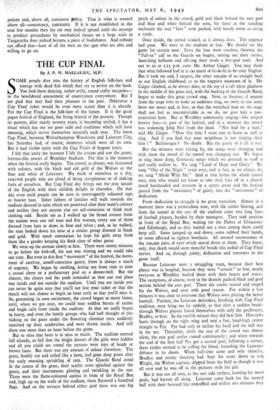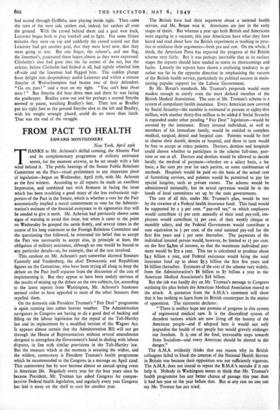THE CUP FINAL
By J. P. W. MALLALIEU, M.P.
SOME people dive into the history of English folk-lore and emerge with dead fish which they try to revive on the bank. You rind them dancing, rather artily, round crafty maypoles— to the bewildered amusement of countrymen everywhere. But I am glad that they find their pleasure in the past. Otherwise a Cup Final ticket would be even more scarce than it is already. For the Cup Final is the folk-lore of the future. It is the great pagan festival of England, the living festival of the present. Though its pattern, after nearly seventy years, is becoming settled, it has a ritual which has not yet gone stale and traditions which still have meaning, which revive themselves naturally each year. The latest Cup Final, between Wolverhampton Wanderers and Leicester City, last Saturday had, of course, moments which were all its own. But it had visible unity with the Cup Finals of bygone years.
I felt that unity the moment I left the station and saw the gaunt, fortress-like towers of Wembley Stadium. For that is the moment when the festival really begins. The crowd, as always, was festooned with colours, with the black and old gold of the Wolves or the blue and white of Leicester. We think of ourselves as a shy, reserved people who are afraid of being conspicuous or of making fools of ourselves. But Cup Final day brings out the .true nature of the English with their childish delight in charades. On that day even staid people can be seen in extravagantly coloured caps or bowler hats. Sober fathers of families will walk towards the stadium dressed in suits which are patterned after their team's colours and neither they nor anyone else are self-conscious or think such clothing odd. Beside me as I walked up the broad avenue from the station were one tall man and five women, every one of them dressed from hats to shoes in blue and white ; and, as he walked, the man looked down his nose at a similar group dressed in black and gold. With mock ostentation he kept his girls away from them like a gander keeping his flock clear of other geese.
We went up the avenue slowly at first. There were ninety minutes to go before the kick-off, the sun was shining and we could take our time. But even in this first " movement " of the festival, the move- ment of carefree, unself-conscious gaiety, there is always a touch of urgency. We began by strolling, letting out from time to time a casual cheer or a perfunctory peal on a dinner-bell. But the chatter, the cheers and the peals reminded us that our real place Was inside and not outside the stadium. Until you are inside you can never be quite sure that you'll not lose your ticket or that the match will not choose to begin an hour early so that you'll miss it. So, generating its own excitement, the crowd began to move faster, until, when we -got near, we could hear sudden bursts of rattles and bugle calls from inside the stadium. At that we really began to hurry, and even the family groups who had half thought of pic- nicking on the grass under the flowering chestnut trees suddenly snatched up their sandwiches and were drawn inside. And still there was more than an hour before the game.
But to miss that hour is to miss so much. The stadium seemed full already, so full that the bright dresses of the girls were hidden and all you could see ratiod the terraces were tops of heads or brown faces. But there was any amount of colour elsewhere. The grass, freshly cut and rolled like a lawn, had gone deep green after the early morning sprinkling of rain. The Guards Band stood ill the centre of the grass, their scarlet coats splashed against the green, and their instruments glinting and twinkling in the sun. There were the flame-coloured azaleas in front of the Royal Box and, high up on the walls of the stadium, there fluttered a hundred flags. And on the terraces behind either goal there was one big patch of colour in the crowd, gold and black behind the east goal and blue and white behind the west, for there in the standing enclosure the real " fans " were packed, with barely room to swing a rattle.
Once inside, the crowd relaxed, as it always does. The urgency had gone. We were in the stadium at last. We should see the game for certain now. Even the fans were carefree, blowing the " Fall-in " call to the Guards on bugles, testing out their rattles, launching balloons and offering their rivals a five-goal start. And out to us at 2.15 p.m. came Mr. Arthur Caiger. You may think that what followed had in it too much of hi-de-hi to be truly English. But it took me and, I suspect, the other too,000 of us straight back to our English childhood, or to the happiest moments of it. Mr. Caiger climbed, as he always does, to the top of a tall white platform in the middle of the grass and, with the backing of the Guards Band, began to make this great crowd sing. Now, in theatres, if anyone from the stage tries to make an audience sing, we twist in our seats, blow our noses and, at best, so that the wretched man on the stage shall not feel as uncomfortable as we do, we give him a non- committal hum. But at Wembley community singing—like striped bowler hats—is part of the festival, and in a moment the crowd was wakening John Peel from the dead. "Not bad for a start," said Mr. Caiger. "Now this time I want you to listen as well as sing. And if you find that your neighbour is not singing—kick him ! " Butlinesque ? No doubt. But the gaiety of it all is real.
But the minutes were ticking by, the songs were changing and with them the mood of the crowd was changing too. We began to sing those deep, Germanic songs which we pretend to scoff at and really wallow in. We sang "Land of Hope and Glory." We sang " Out of the Night " twice over, and at last, as we always do, we sang " Abide With Me." And at that hymn the whole crowd rose, men who would not know to take their hats off in a church stood bareheaded and reverent in a sports arena and the festival passed from the " movement " of gaiety into the " movement " of dedication.
From dedication to struggle is no great transition. Almost in a moment there was a tremendous roar, with the rattles blazing, and from the tunnel at the east Of the stadium came two long lines of football players, headed by their managers. They took position in front of the Royal Box, waiting for the Dukes of Gloucester and Edinburgh, and as they waited not a man among them could keep still. Some jumped up and down, some rubbed their hands, or some affected to tighten bootlaces. All seemed unconscious of the roo,000 pairs of eyes' which stared down at them. They knew, only, that death would seem merciful beside this ordeal of Cup Final nerves. And so, through gaiety, dedication and tenseness to the game itself.
Because Leicester were a struggling team, because their best player was in hospital, because they were " certain " to lose, nearly everyone at Wembley backed them with their hearts and voices. The exceptions, of course, were in the densely packed black and gold section behind the east goal. There the rattles roared and rasped for the Wolves, and soon with good reason. For within a few minutes it was clear to everyone that Wolves were playing the better football. Further, the Leicester defenders, breaking with Cup Final tradition, were lying too far upfield, so that after a sudden break- through Wolves players found themselves with only the goalkeeper, Bradley, to beat. In the twelfth minute they did beat him. Hancocks burst through on the right wing and sent a fast, head-high centre straight to Pye. Pye had only to incline his head and the ball was in the net. Thereafter, while the rest of the crowd was almost silent, the east goal rattles roared continuously ; and when towards the end of the first half Pye got a second goal, following a corner, these rattles seemed to be calling for blood, hounding the Leicester defence to its doom. When half-time came and only miracles, Bradley and erratic shooting had kept the score down to 2-o, Wright, the Wolves captain, skipped from the field as though it was all over and he was off to the pictures with his girl.
But it was not all over, as the east side rattlers, howling for more goals, had known all along. Leicester came back for the second half with their forward line reshuffled and within two minutes' they had scored through Griffiths, now playing inside right. Then came the turn of the. west side rattlers and, indeed, for rattlers all over the ground. With the crowd behind 'them and a goal won back, Leicester began both to play football and to fight. For some fifteen minutes they were on top and suddenly the crowd roared out that Leicester had got another goal, that they were level now, that they were going to win. But one finger, the referee's, and one flag, the linesman's, punctured these hopes almost as they were expressed. Chisholm's shot had gone into the far corner of the net, but the referee, before Chisholm had kicked at all, had rightly whistled him off-side and the linesman had flagged him. The sudden plunge from delight into despondency undid Leicester and within a minute Smythe of Wolverhampton had beaten two of their defenders. "Go on, pass! " said a man on my right. "You can't beat three men !" But Smythe did beat three men and there he was facing the goalkeeper. Bradley came out and for perhaps a second Smythe *caned to pause, watching Bradley's feet. Then- just as Bradley put his right foot to the ground Smythe shot to the left and Bradley, with his weight wrongly placed, could' do no more than lurch. That was the end of the struggle.







































 Previous page
Previous page